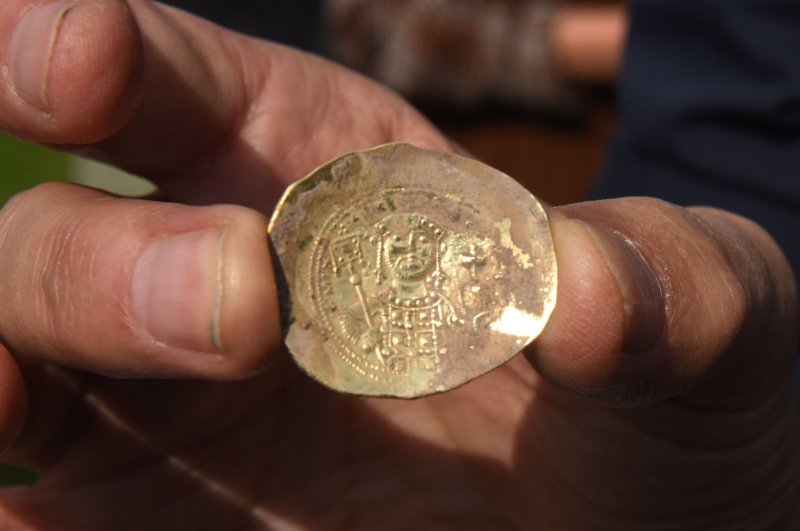1 of 8 | Dr. Robert Kool, coin expert of the Israel Antiquities Authority, holds a gold coin that is part of a cache of 24 gold coins and a 900 year old gold earring found in the port of Caesarea, Israel on Monday. Photo by Debbie Hill/UPI |
License Photo
Dec. 3 (UPI) -- There was no rainbow, but archaeologists in Israel have recovered a pot of gold.
The bronze pot filled with gold coins and an earring was excavated from a dig site in the ancient city of Caesarea. The pot and its contents date to the 11th century AD.
Through the centuries, Caesarea was conquered several times. First built by Herod the Great between 20 and 11 BC, Caesarea proved an important port city to several conquerers, including the Roman and Byzantine empires. Archaeologists think the pot of gold was stashed as invaders ransacked the city, some 900 years ago.
The stash of coins -- minted by the Christian Byzantine Empire and the Muslim Fatimid Caliphate -- was found between two stones in the wall of a well. The well abutted a house that dates to the city's Islamic period.
"The coins in the cache, dating to the end of the eleventh century, make it possible to link the treasure to the Crusader conquest of the city in the year 1101 AD, one of the most dramatic events in the medieval history of the city," archaeologist Peter Gendelman said in a news release.
Gendelman and archaeologist Mohammed Hatar of the Israel Antiquities Authority directed the Caesarea excavation.
"According to contemporary written sources, most of the inhabitants of Caesarea were massacred by the army of Baldwin I, king of the Crusader Kingdom of Jerusalem," Hatar said. "It is reasonable to assume that the treasure's owner and his family perished in the massacre or were sold into slavery, and therefore were not able to retrieve their gold."
Archaeologists previously recovered valuable stashes at nearby dig sites in the 1960s and 1990s, but the newest find is especially rare.
"The cache is of a unique combination of coins not yet seen in Israel consisting of two types of coins: 18 Fatimid dinars, well known from previous excavations in Caesarea where it was the standard local
currency of the time; and a small and extremely rare group of six Byzantine imperial gold coins," said Robert Kool, coin expert at the IAA.
The latest excavations are part of an ongoing effort to unearth the city's port vaults and document the wealth generated by one of antiquity's most important commercial harbors.















